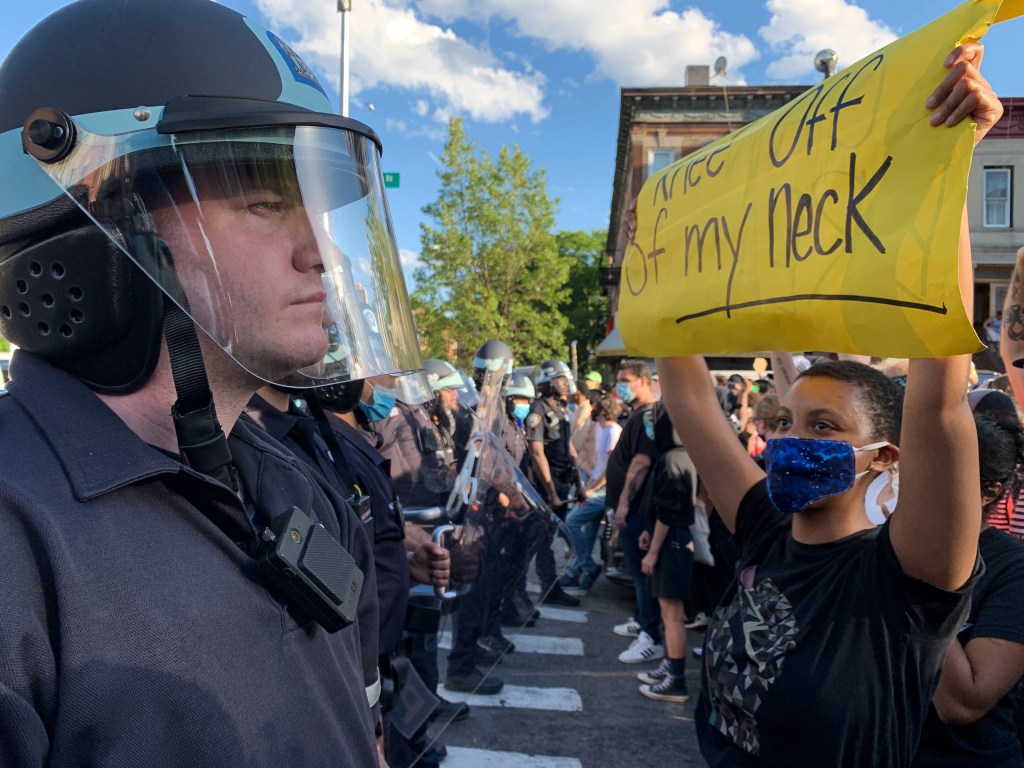Scientists around the world and across disciplines are abstaining from their normal work on Wednesday to participate in the Strike for Black Lives, an event held in solidarity with Black Lives Matter and the ongoing global protests against racist acts of police brutality.
Spearheaded by Brian Nord, an astrophysicist at the University of Chicago and Fermilab, and Chanda Prescod-Weinstein, a cosmologist at the University of New Hampshire, the strike has attracted more than 3,000 participants, representing academic institutions across the globe.
Videos by VICE
The strike is “urgently needed,” according to a statement on the event’s website, Particles for Justice. “We recognize that our academic institutions and research collaborations—despite big talk about diversity, equity, and inclusion—have ultimately failed Black people,” the statement reads.
“Demands for justice have been met with gradualism and tokenism, as well as diversity and inclusion initiatives that—while sometimes well-intentioned—have had little meaningful impact on the lived experiences of Black students, staff, researchers, and faculty.”
In addition to the thousands of individual scientists who have pledged to particulate in the strike, STEM institutions such as the American Physical Society, the academic preprint server arXiv, and the scientific journal Nature will close on Wednesday in support of the event. People have also spread the word about the strike on social media using hashtags such as #strike4blacklives, #shutdownSTEM, and #shutdownacademia.
“Scientists are also community members and neighbors,” said Fèini Yĭn, an organizer for the national activist collective Free Radicals and former Motherboard intern, in a call. Yĭn noted that there’s a widespread reluctance within STEM to engage in anti-racist efforts due to entrenched notions of nonpartisan research.
“Sometimes, it makes scientists forget that they are also part of society and therefore have an obligation to meaningfully participate and contribute to forward movement,” they said.
Indeed, ignoring the corrosive and enormous role that white supremacy has played in the history of science is itself a political act, and hardly an example of scientific objectivity. For centuries, BIPOC have been dehumanized by racist ideas—promoted and accepted by prominent scientists—at the same time that they were routinely excluded from participating in scientific institutions.
The discrimination persists to this day, resulting in a STEM community that has impoverished itself by failing to attract and retain a diverse and demographically representative workforce. In the United States, only nine percent of doctoral researchers in STEM fields are Black, Latinx, or Native American scholars, according to a recent paper by Maria Miriti, an ecologist at The Ohio State University, in the journal BioScience. Meanwhile, BIPOC make up only four percent of the STEM faculty at competitive American universities.
“There is strong reluctance to address issues of race or racism in the unrelentingly low representation of people of color in the academy,” Miriti said in the study. “Although it is difficult to broadly confront questions of race and racism in institutions, if broad participation in the STEM academy is to be achieved, such a confrontation is necessary.”
Wednesday’s strike is one way to encourage this necessary confrontation, and its organizers are particularly vocal about the frustration of Black scientists at having to shoulder anti-racist efforts within academia as their colleagues fail to step up. When an academic is the only BIPOC in a department, the work of advocating for more equitable institutions—or simply acknowledging the racist legacies of STEM fields—almost always falls on them.
“We are conscious of the ways in which Black students and scholars, including two authors of this letter to the community, are expected to do the heavy lifting to advocate for and support justice and representation in academia,” said Nord and Prescod-Weinstein on the Particles for Justice website. “We know that this burden functions as an unfair and unevenly distributed barrier to their ability to thrive in academia.”
To address this exploitative dynamic, the strike is intended to provide a day of rest for Black scientists and an opportunity for everyone else to educate themselves on past and present racial disparities, with the hope that they will actually be addressed in the future. To that end, Particles for Justice has put together a list of recommended resources to engage with during the strike—and beyond.
The Strike for Black Lives is already energizing the STEM community, and raising awareness of the entrenched inequities within it. But the strike is also just one moment in a continuum of much-needed sustained pressure for major anti-racist action within the global academic and scientific sphere.
“I think that STEM is inherently about creating what’s next,” said Yĭn, who added that they think the current structure of the STEM workforce will need to be radically overhauled to create real change.
“Hopefully, people are really finding the educational materials that are out there, that have been created by Black thinkers, and educating themselves and then in turn starting conversations within their teams and within their organizations,” they concluded.
More
From VICE
-

Screenshot: Steam -

Photo: Ryan Young / Cornell University -

Photo: Eetum / Getty Images -

Photo: Lajst / Getty Images
